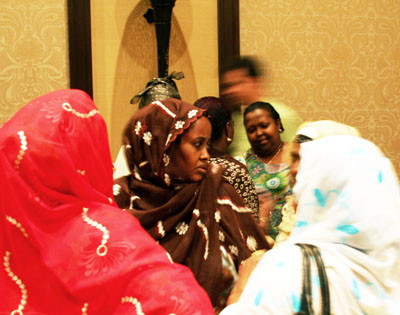
NAIROBI, Kenya — Last week two girls, aged 14 and 18, were shot in a public execution in Somalia after the extremist al Shabaab Islamic movement accused them of being spies.
But as the news broke, a group of Somali women were meeting in Nairobi to discuss their role in bringing peace to the war-torn country.
“You have been living among beasts,” said a Somali woman who had traveled from Canada to attend the meeting, addressing those women who have remained in Somalia despite the risks. “You are the vehicle and machine for moving to peace in Somalia.”
The Somali Women’s Agenda, or SWA, represents nearly 200,000 women in Somalia and the diaspora. A core group meets regularly, traveling from North America and Europe to join members living in east Africa.
The SWA must tread carefully around political issues in Somalia to protect its members. Even some of the most vocal members shied away from the few photographers circulating at the meeting and asked that their names not be mentioned. As a group, the SWA doesn’t engage with Shabaab or other extremist groups, but the women spoke often of the unique advantage of being able to reach perpetrators and ideologues through their influential roles as mothers and wives.
One woman told me about a recent incident in which Shabaab had abducted a nurse who worked at Mogadishu’s main hospital. The woman telling the story, who was draped in a bright green floor-length baati and headscarf with glittery embroidery, was known as a local advocate and was called to come negotiate the nurse’s release. She said the Shabaab obliged her request that they release the nurse because they knew of her influence in the community.
While acknowledging the important role women play in the humanitarian sphere, many participants also emphasized the value in pushing for women to play a more active role in political life in Somalia, in spite of the extremists’ severe views of women.
“Your participation will not be given to you, you’ll have to take it,” said Fred Ngoga, a representative of the African Union peacekeeping mission, in remarks on the final day of the meeting. He called on women leaders to work in their communities to “lay the groundwork for AMISOM to liberate” areas under control by extremists.
Promoting the role of women in politics and peace processes is a cornerstone of the Somali Women’s Agenda, and the group can boast some notable victories over the past three years. A number of their members are elected officials in the local and federal government. The SWA also strongly advocated for women to be represented in the commission reviewing Somalia’s new draft constitution, succeeding in getting seven women on the 30-strong commission, two of them members of the SWA.
I asked whether the divisions that have plagued Somalia have transferred into their movement of women and hampered their work. The president of SWA said that common experiences – tragic though they have been – enable the women to look beyond their differences. “We’re all in the same boat,” she said.
“When the women realize many of their problems are shared – their husbands have been killed, they’ve been looted or victims of sexual violence – they can’t dwell on differences” like clan.
Akinyi Nzioki, a professor who has worked with women’s groups across the continent, including in Liberia, Sudan, and her native Kenya, has worked as a facilitator for the Somali Women’s Agenda for three years.
“This group of Somali women is the strongest," she said of the SWA, comparing it to the many other women's groups she has worked with. "It has the most potential."
But the women are coping with very serious trauma, Professor Nzioki said. She pointed to the very emotional nature of discussions even within this relatively small group of women leaders as evidence of how deeply Somali society has been affected by decades of war. A trauma counselor regularly participates in SWA gatherings, and the sessions with her have had a noticeable impact on the ability of the group to have productive, respectful discussions, Nzioki said.
The SWA’s president said that this movement of women leaders will be an important foundation on which to rebuild the Somali society when peace comes to the country – far away though that may be. “These are problems that will endure for a long time,” said the SWA president. “But we can never just sit and stop what we’re doing. Even some day when we have peace, we will continue to struggle for reconstruction.”
A version of this post also appeared on Change.org's Human Rights blog.

